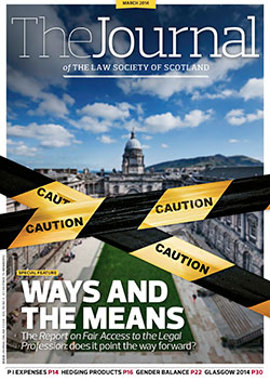Land Court: business as usual

While the agricultural world’s recent focus has been on the Government’s review of the Agricultural Holdings (Scotland) Acts and “the Salvesen fix”, it has been business as usual for the Land Court. Three cases are of interest.
Paton v Maclean (Applic SLC 97/12)
In terms of a post-lease agreement (PLA), the tenant had accepted the whole fixed equipment on her holding as in a state of repair sufficient to enable her to maintain production. On termination of her tenancy, she claimed for various works said to come within the 1991 Act, s 33A, on the premise that the equipment supplied at commencement was insufficient to fulfil her obligations under the lease.
The tenant contended that s 33A superseded the acceptance provision which might otherwise preclude the leading of evidence on the matter. The landlord countered that, as the legislation had not attempted to set aside the extrinsic evidence rule, it should prevail, so as to prevent evidence being led that the PLA was inaccurate.
The court held that Parliament had intended to strike at agreements which had the effect of restricting compensation, and not just those which did so expressly. It construed the words “which purports to provide” (that compensation is to be less than the tenant’s statutory entitlement, or excluded altogether) as equivalent to “having the effect of providing”, requiring the effects of a PLA to be considered rather than the language used. The landlord’s challenge to the relevancy of evidence sought to be led by the tenant failed.
Trustees of the Drummond Trust v Baird (Applic SLC 175/12)
The landlords of a 22.53ha pastoral holding sought consent to a notice to quit, purporting to be given under “case 6 of Schedule 2” to the 1991 Act “on the ground that the holding or any agricultural unit of which it forms part is not a viable unit”. Case 6 had not yet been amended to substitute “viable unit” for “two man unit”. The tenant contended that the notice was invalid for that reason. Further, the ish for an unwritten lease for grazing is Whitsunday, not Martinmas (against which the notice had been served). The court held, re the notice, that the reference to case 6 was sufficient to meet the statutory requirements, and the other terms of the notice did not detract from that. Further, although there might be a presumption of a Whitsunday entry, the material provided to the court was sufficient to justify the Martinmas ish. The tenant also failed in her attempt to question whether the landlord’s application had been lodged timeously.
Fish v Church of Scotland General Trustees (Applic SLC12/13)
In correspondence with the tenants, the trustees intimated that they intended to sell a strip, part of a field let to the tenants and which they ran with the remainder of the glebe (in their ownership), along with a redundant church, to provide it with parking and drainage. No active steps were taken, however, to sell the property. The tenants registered their interest in purchasing the field. The trustees issued notice of resumption and sought declarator that it was valid.
The tenants argued that the proposed resumption was a fraud on the lease, as it would reduce the field by some 20% and remove an access; also that the resumption was an attempt to circumvent their right to buy, which was enforceable because of the earlier correspondence.
Holding the notice valid, the court said that “fraud on the lease” was a shorthand way of saying the lease had to be read consistently with the deemed intention of the parties when they entered into it. The extent of the resumption could not be said to be outwith the parties’ contemplation, whether the field was viewed on its own or treated as part of the original glebe. Although use of the access would be important for cattle, the tenants’ sheep enterprise could continue. The fraud issue required the court to consider the potential impact of the resumption on the tenants’ business, not the landlords’ purpose. It was not necessary that the particular resumption should have been contemplated.
The purpose of the resumption was not “circumvention of the legislation”, as the trustees plainly wished to develop the strip to enhance the value of their building, not to prevent the tenants from buying it.
The tenants’ right to buy had not been triggered. The initial correspondence had preceded the registration of the tenants’ interest, since when the trustees had neither issued a s 26 (2003 Act) notice nor taken action “with a view to the transfer of land” within the meaning of s 28(3), in that the land had not been advertised or exposed for sale. Nor had the trustees entered into negotiations with a view to its transfer.
In this issue
- The role of "attachment" in child custody and contact cases
- No protocol – what expenses?
- Ecocide: a worthy "fifth crime against peace"?
- Mandatory mediation: better for children
- Reservoir safety regulation: a changing landscape
- Reading for pleasure
- Opinion: Mark Hordern
- Book reviews
- Profile
- President's column
- Digital deeds move closer
- Fair access - a fair way to go
- No protocol – what expenses? (1)
- Hedges: not all bad news
- Daring to be different
- Financial planning or wealth management – is there a difference?
- Success in the balance
- Wealth management for business leaders and owners
- Purpose of the protocol
- Actionable data wrongs?
- Land Court: business as usual
- Penalty points
- Scottish Solicitors' Discipline Tribunal
- Fever pitch
- Heritage regained
- All grist to the mill
- Wills: is it OK to act?
- Gongs, dinners and just deserts
- Perils of the home
- Ask Ash
- Scots lawyers debate Union in London
- Public Guardian news roundup
- Law reform roundup
- Personal Injury User Group at your service
- Diary of an innocent in-houser






